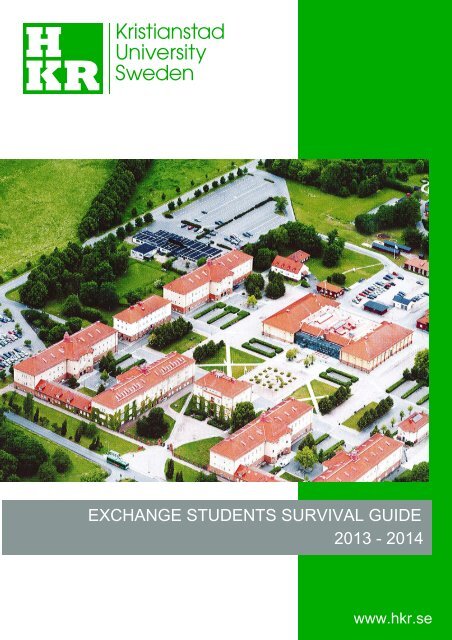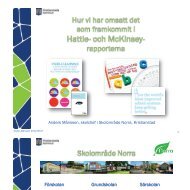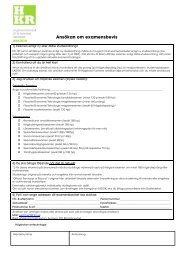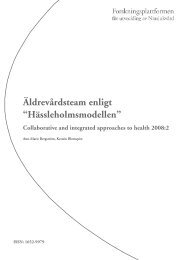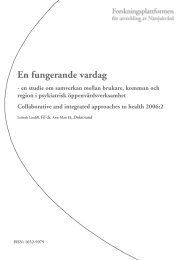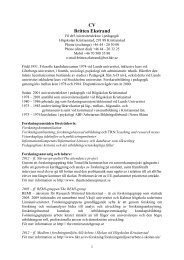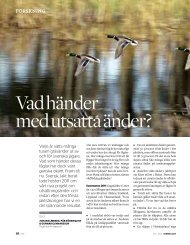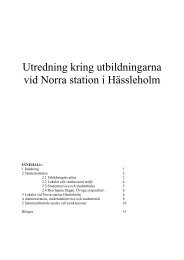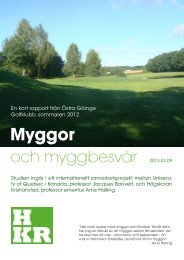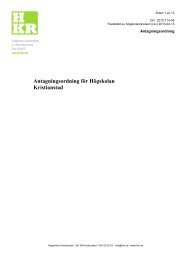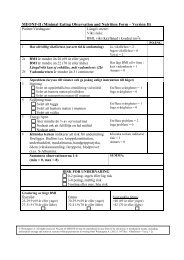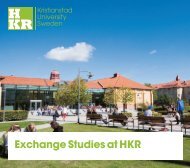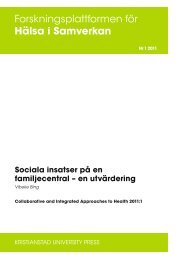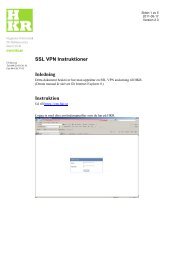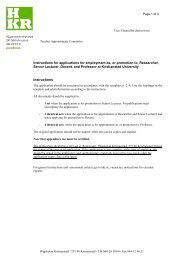Survival Guide - Högskolan Kristianstad
Survival Guide - Högskolan Kristianstad
Survival Guide - Högskolan Kristianstad
You also want an ePaper? Increase the reach of your titles
YUMPU automatically turns print PDFs into web optimized ePapers that Google loves.
Dear Student,We are glad to welcome you to <strong>Kristianstad</strong> University.We hope that your time here in Sweden is going to be interesting and fruitful,concerning both academic studies as well as your personal development in a multiculturalenvironment. You will certainly discover new things, open your mind andsee the world differently.With this “<strong>Guide</strong>” we provide some useful and important information to you.Please read everything carefully, as it might answer most of your questions andhelp you to avoid problems before and during your stay. Do not forget to takethis guide with you when coming to Sweden.Once again – welcome to <strong>Kristianstad</strong>!4
You can reach <strong>Kristianstad</strong> easily by plane, train or car.Although <strong>Kristianstad</strong> has its own airport, the easiest way for you might be to flyto Copenhagen (Denmark). Malmö also has a small international airport for cheapflights from Germany, the UK and the Czech Republic. Växjö (Småland) has anothersmall airport in the region that offers some international flights.From Copenhagen Kastrup Airport (CPH)From the train station at Copenhagen Airport (Kastrup), there are hourly trains to<strong>Kristianstad</strong>. (Price: ca. SEK 200). There are some direct trains, but be aware thatthere are also combinations in which you might have to change train in Malmöand/or Hässleholm. The train schedules can be found on this website:www.skanetrafiken.se. For more information; check “By train” in the next page.From Malmö Sturup Airport (MMX)Airport buses leave regularly taking you to Malmö train station where there aredirect trains every hour to <strong>Kristianstad</strong>.From Småland airport (VXO)You should take a taxi from the airport to Växjö, as there are currently no airportbuses. From Växjö you can travel to <strong>Kristianstad</strong> by train. Be aware that you haveto change trains at least once. Usual changes are in Alvesta and Hässleholm.From <strong>Kristianstad</strong> Airport (KID)From <strong>Kristianstad</strong> Airport, there are taxi shuttles to the train station and the busstation (Price: ca. SEK 80). Normal taxis, which are also available, are more expensive!However, if you arrive during the arrival days at <strong>Kristianstad</strong> airport, you willbe picked up there by the international assistant.5
The train station is situated in the center of <strong>Kristianstad</strong> (there is only one trainstation in town). For the train schedules please visit these websites:http://www.skanetrafiken.se or http://www.sj.seIn Sweden headlights must be switched on all the time, even during the day!There are three main options to reach <strong>Kristianstad</strong>:Option 1: arriving via the Öresundsbridge:Road „E22‟ direction Kalmar. After about 100 km, you will arrive to <strong>Kristianstad</strong>.Option 2: taking the ferry to Helsingborg:Roads „E4‟ and „21‟Option 3: taking the ferry to Trelleborg:Road ´108‟ direction Lund and then „E22‟ direction Kalmar/<strong>Kristianstad</strong>.6
Way to <strong>Kristianstad</strong> University and KreboIn <strong>Kristianstad</strong> you follow the direction Sjukhus (hospital). After leaving the motorway,you‟ll pass a traffic light and you arrive at a big roundabout. Cross theroundabout, then go straight-ahead (Snapphanevägen). After ca. 2 km, you‟llcross a bridge. Turn left at the traffic light, drive straight to the next roundaboutand turn right there, direction Högskolan. You cross the next roundabout to arriveat the university. After you pass the university you turn right to arrive at Krebo.<strong>Kristianstad</strong> University provides a pick-up service to all exchange students arrivingduring the arrival days.The arrival days for the academic year 2013/2014 are:• Autumn semester: 23-25 August• Spring semester: 18-19 JanuaryThe staff of the international office will welcome you at the train station or airport(in <strong>Kristianstad</strong>) and will bring you to your accommodation. If you arrive by car,we will meet you at the dorm to welcome you and to give you the keys of yourroom.To make use of the pick-up service you should fill in the Information about Arrivalin the online application as soon as possible, and minimum 2 weeks before youarrive.If you arrive before or after the arrival days you should take a taxi or bus to youraccommodation.Bus number 4 brings you from the central station to the university (stop Högskolan).Bus number 1 brings you from the central station to Brinova (stop Centralsjukhuset).7
transitions prevents the linkage of scales between point and remotely sensed observations.Observational clusters must be designed to characterize the continuum of evapotranspirationacross the landscape.[20] Runoff. Empirical seasonal runoff forecasts in snow-dominated systems, normallypresented as outlooks for operational water supply, are based on historical relationships betweenpoint observations of snow and observed runoff. These empirical models perform best near meanconditions but poorly during conditions that are not well represented in the historical record. Forimproved hydrograph forecasts, which are critical for flood control, hydropower operation andresource management, the movement with the research community toward more physicallybased models with greater data needs is a strong driver for both process understanding and newobservational networks [Burges, 1998].3. Ecological and Biogeochemical Feedbacks[21] Ecological and biogeochemical feedbacks play crucial but poorly understood roles in thefunction of mountain hydrologic systems. At the same time, fluxes of carbon and nitrogen inmountain systems are important to both the local and global biogeochemical cycles. Forexample, modeling suggests that in the western U.S., net ecosystem exchange (NEE) is greatestin the mountains (Figure 7) and observations indicate that influxes of nitrogen and otherpollutants are increasing. Most of the carbon exchange (60%) occurs between 700m and 2000melevation, related to a combination of warmer temperatures than those at higher elevations andmore water than at lower elevations [Schimel et al., 2002; Gordon et al., 2004]. However, veryfew data are available to evaluate fluxes at these and higher elevations, owing to there being fewshort- or long-term meteorological stations and almost no flux towers. Flux towers, the mostwidely used method for estimating net ecosystem exchange, are generally in flatter lowland areas10
Please pay attention that <strong>Kristianstad</strong> University does not cover any costs regardingmedical treatment, dental care, loss of property etc. Please note that it can beextremely expensive if you need medical care and you do not have any insurance!If you are not feeling well, you can visit the Student Health Service. The StudentHealth Service consists of a nurse and two counselors and can be found inMetropol on the second floor.The visit drop-in hours are Monday-Thursday from 10.00 to 12.00. You can alsocontact them to make an appointment.You can visit the Student Health Service for all kind of problems, for example: infections,stress, depression, etc. All visits are free of charge for students from <strong>Kristianstad</strong>University.For more information you can visit: http://www.hkr.se/student-healthContact information:Name E-mail TelephoneAnne Gerd Carlsson annegerd.carlsson@hkr.se +46 44 20 30 95NurseCamilla Dahlquist-Melin camilla.dahlquist-melin@hkr.se +46 44 20 30 93CounselorJohan OlssonCounselorjohan.olsson@hkr.se +46 44 20 30 9112
In case of emergency you should call: 112If you need to visit a physician you should always have your insurance card andidentification with you. Be aware that you might be asked to pay directly at theclinic.Contact information:Name Visiting address TelephoneVårdcentralen Näsby Tvedegårdsvägen 4+46 44 309 01 00291 38 <strong>Kristianstad</strong>Vårdcentralen Östermalm Österlånggatan 23+46 44 309 00 50291 33 <strong>Kristianstad</strong>Central Hospital J A Hedlunds Väg 5291 33 <strong>Kristianstad</strong>+46 44 309 10 00You can always contact the University Health Service or the International Office ifyou need to visit a doctor. If you need to visit a dentist, you can contact the internationaloffice.You can find pharmacies (Apoteket) in the city center (near Domus) and near theUniversity, next to the ICA supermarket.13
If you are planning to study as an exchange student in Sweden for longer thanthree months, you must have a residence permit. For further information you canvisit the website of the Swedish Migration Board:http://www.migrationsverket.se/info/153_en.htmlPlease take a very good look at the information on this website!Citizens from certain countries must have an entry visa, also for studies that areshorter than three months. We advise you to check with the closest Swedish embassyor consulate to see which rules apply to you. Be aware that the applicationprocess for a visa takes several weeks! You can find the address of the Swedishembassy in your country on:http://www.swedenabroad.comIf you wish to work during your studies, you must have a student residence permitand you must have completed at least 30 ECTS credits or one term of postgraduateeducation in Sweden. However, it is difficult to find a part-time job in<strong>Kristianstad</strong>, especially if you don‟t speak Swedish. In addition you have to findand organize a job on your own.As an EU/EEA citizen you have the right of residence in Sweden and may studywithout a residence permit. If you would like to stay longer than three months,you have to register with the Swedish Migration Board. There are no costs forregistering. For more information you can visit:http://www.migrationsverket.se/info/150_en.htmlOn the website of the European Union you can find more information about yourrights and administrative formalities while staying in another EU country:http://ec.europa.eu/youreurope/citizens/residence/student/index_en.htm14
<strong>Kristianstad</strong> University was founded in 1977, but we can trace our roots way backto teacher's training (1835), nurses (1893) and engineers (1912). Programs andcourses are offered in Humanities, Social, Natural, Behavioral and Health Sciences,Business Administration, Computer Science and Engineering.The main campus of the university is situated in <strong>Kristianstad</strong>. The technical departmentis situated in Hässleholm, about 20 minutes by train from <strong>Kristianstad</strong>.For more information about Hässleholm please visit:http://www.hkr.se/hassleholm-enThe main campus is created from the idea that you, as a student, shall have accessto modern information technology, inspiring meeting places and good services.We offer a highly qualified faculty in a friendly atmosphere. Our new andformer students are our most valuable resource.Internationalization is an issue of importance at <strong>Kristianstad</strong> University, whether itinvolves Swedish students going abroad or international students studying here.15
We also provide all students with an international working perspective on Campus.We are linked with partner universities all over the world. At the same timewe co-operate extensively with the local community.Everything on campus is quite easy to find. The numeration systems functions asexplained with the following example: Room 15-226 means: House 15, Room 226on the second floor. Notice that in Sweden the ground floor is named first floor.<strong>Kristianstad</strong> University is dedicated to create equal opportunities in the academicenvironment also for students with special needs.The concept „functional disability‟ refers to physical or mental restrictions of aperson‟s ability to function and to reading and writing difficulties/dyslexia. In orderto get access to the supportive measures, you have to verify your functionaldisability with a testimonial.If you are in need of supportive measures, you should first of all contact the coordinator.For more information please see:http://www.hkr.se/functional-disabilities/A light and spacious library is situated in house 7 in the center of the campus.You can borrow books free of charge with your own library card (Lånekort). It ispossible for all students to borrow media equipment free of charge, such as videocameras, digital cameras, etc.Study rooms are available. A reading room, which is also equipped with computers,is accessible 24 hours a day. During the Introduction Week you will be providedwith the information about how to use the library. For more informationplease visit: http://www.hkr.se/en/study-at-hkr/lrclibrary/16
On campus, you find a few places where you can eat during the day:- Restaurant Metropol offers a lunch buffet.- The cafeteria in house 7 offers sandwiches, salads, pasta etc.- Vending machines with drinks and snacks are available in most buildings.The production unit is situated in House 11 on campus. You can visit the productionunit for questions related to photocopying and access cards.The opening hours are: 07.30-09.00 09.30-12.00 13.00-14.00 14.30-15.30If you loose something on campus you can visit the desk at the entrance ofhouse 7. Please, also bring found items to the same desk.During your introduction week, you will receive an access card allowing you toenter some areas of the University, in the department where you study, 24 hoursa day. Upon receiving your card, you have to choose a four-digit personal codethat will be necessary when accessing those areas. The cards are personal andmust not be given to a 3 rd person and must be returned to the international officewhen you finish studying here. Lost cards must be reported to the productionunit to be blocked without any delay. A new card can then be obtained for a feeof 50 SEK.While entering the buildings, the cardholder has to make sure that no unauthorizedperson enters the building at the same time. To exit, always use the releasebutton for the doors. Do not open the emergency exit cap on the door; it is connectedto the alarm system. If doors with the sign “Larmad dörr” are open formore than one minute, the alarm will go off, so please be careful with this.17
Each department has its own computer facilities (including laser printers) for students.These are generally accessible 24 hours a day, 7 days a week. Be preparedto show your ID card/passport to the security guards if you stay in the computerrooms during the night. Ask your department for detailed rules. You will have topay for printouts via your print account. When you start using your computer accountit will be charged with 25 SEK. You can recharge your account easily at themachine in house 15. A black and white printout costs 0,50 SEK per page and acolored print out costs 4 SEK per page. Computer rooms can be found in the followingbuildings: 07-312, 07-323, 14-125, 14-427, 15-220, 12-223, 17-119, 20-117,20-418 and 21.You can get photocopy cards at a reasonable cost at the desk in the entrance ofthe library. There are two possibilities: You either buy a photocopy card or youborrow one and pay for each copy at the desk. If you make a lot of copies, it ischeaper to buy a copy card. You can also visit the Production Unit; they copy andbind material for a good price.The university sport union is called HKIF. HKIF arranges various sports activitiesalmost every evening of the week. Most activities take place in the sports hall oncampus. Examples of sports offered are: badminton, basketball, football, boxexerciseand volleyball. Twice a week swimming is offered in the swimming poolin <strong>Kristianstad</strong>. It costs 90 SEK per semester to be a member of HKIF and whenyou are a member you can join all activities free of charge. You can find HKIF inMetropol. For more information you can check:http://www.hkif.se18
The Student Union is an independent organization, run by students for students.Their main purpose is to improve the quality of education and students possibilityto influence their own situation at the University. In addition they arrange differentsorts of social activities. The chairman and vice-chairman are full-time employedand will you can contact them for all your problems that concern the environmentof your studies at <strong>Kristianstad</strong> University. You can find the student unionin Metropol.If you want to become a member of the student union you have to pay a membershipfee. The student union‟s fee is approximately 200 SEK per semester.For more information please visit:http://www.ksk.nu/19
The university chaplains organize student services in English.For more information you can contact:Arne Tegnér arne.tegner@hkr.seAstrid Nydahl astrid.nydahl@hkr.seDo you want to meet a Swedish person? If so, you can join the tandem project.This project is created with integration as its main purpose. An international studentwill meet a Swedish person. Both of you can decide for yourself how youoften you want to see each other and what you want to do. We will help you withthe first contact; everything else is up to you! You can just meet for a coffee,study together, meet for parties etc. If you get along well, you can keep in contactfor more activities. If you don‟t get along, just part ways after the first meeting.Does this sound interesting? Just come to the International Office or write anE-Mail to lhena.revhult@hkr.se20
Education at Swedish universities is based on the principle that students take responsibilityfor their studies, with support from the teachers. Student responsibilityand individual performance are stressed. Teaching is carried out in differentforms: lectures, seminars, group work, independent study etc. Students are expectedto raise questions and to take part in discussions during lectures. In addition,they are required to write short essays, solve specific problems and describethe procedure applied. Examinations seldom require that students merely reproducethe material presented during lectures. Be aware that a good level of Englishis necessary to be able to follow the courses.Often you have only one of your “main” courses at a time, followed by the exam.That means that you can concentrate on one subject before the next coursestarts. It also means that exams take place during the semester, and not only atthe end of the semester. To many international students, the Swedish academicenvironment seems very informal. Teachers and other members of staff dress informallyand speak in a familiar style to students.You can find all courses given in English at the following webpage:http://www.hkr.se/courses4exchangeTwo courses are specifically for international students:• Sweden Past and Present• Swedish for International StudentsIf you click on a course name, you can find more information about the course.You will find the examiner of the course, a description of the course, contact information,etc. If you click on „To schedule‟ you will find the schedule of thecourse. Be aware the schedule might not be published until shortly before the21
course starts. Changes can occur, so please check the schedule regularly. You canalso see in which period the course is given. Note that in Sweden the academicschedule is often expressed in weeks (veckor). V36-V45, means that a coursestarts in week 36 and ends in week 45.Under type of course you will find if a course is given full time (100 %) or parttime(25-50 %). If a course is given part-time, you can take another course in thesame period. „Web-based distance‟ means that a course is given over the internet,so there are no classroom lectures.Together with your home university you should select courses and afterwards youshould fill in the learning agreement and let it be signed by the coordinator atyour home university. Your home university certifies with his signature that thecourses will be recognized after passing the exams during your time abroad.When the learning agreement is signed, you can send it to our internationaloffice or take it with you to <strong>Kristianstad</strong>. If you want to change your courses,you should always check with your home university if they agree with yourchange. You can visit the international office to ask for a change of courses. Afteryour courses are changed, you should fill in the changes in your learning agreementin the online application.A course can be examined in various ways. A common method is a written or oralexamination that includes the presentation of a paper. Group papers are normallydiscussed during seminars towards the end of a course. A written examinationtakes place at the very end of each course. Continuous assessment is used insome courses and is based on compulsory attendance as well as participation inseminars arranged throughout the course.A student who fails an examination is entitled to re-sit the examination at prescheduledtimes until it has been passed. As exchange students stay for a limitedperiod of time only, they are assured of at least one more chance to take the ex-22
amination later. It might also possible to do the re-exam at the home universitywhen you are back in your country.On the following website you will find the examination rules. Please read themcarefully! No exceptions will be made during exams! You can also find a specificdocument regarding deception and how to handle disciplinary matters.http://www.hkr.se/examination-enThe European Community Credit Transfer System was developed by the Commissionof the European Communities in order to provide common procedures toguarantee academic recognition of studies abroad. It provides a way of measuringand comparing learning achievements, and transferring these from one institutionto another.The ECTS system is based on the principle of mutual trust and confidence betweenthe participating institutions. To reinforce these principles a few rules havebeen established: the students have to be informed about available courses, anagreement has to be signed between the home and host institution and thegrades have to be presented in ECTS credits to indicate a student‟s workload.Each course offered needs to have a detailed description about its contents andthe awarded ECTS credits60 ECTS represent one full academic year, and 30 ECTS one full semester. Oneweek‟s full-time studies correspond to 1,5 High Education Credits: a fulltime 7,5ECTS course will thus normally be scheduled over a 5-week period. Included inthe work load are lectures, practical works, seminars, private studies and examinationor other assessment activities. ECTS credits thus express a relative value.Traditionally, three grades are awarded at Swedish universities: passed with distinction(VG) passed (G) and fail (U). Exceptions are sometimes made and in this23
case there are only two grades: passed (G) or fail (U), see the syllabus of yourcourses for more information. Engineering courses are usually graded from 5-3(passed) and fail (U).To facilitate the recognition of your grades achieved during your time abroad,they will be translated into ECTS grades. ECTS are given in six grades: From A-E(passed) to FX (fail). The following table shows the equivalents for ECTS grades:ECTS grade Swedish system DefinitionA VG"starkt"G"(mycket)5 EXCELLENT: outstanding performancewith only minor errorsstarkt"B VG"vanligt"G"starkt"4 VERY GOOD: above the average standardbut with some errorsC G"starkt"G"vanligt"4 GOOD: generally sound work with anumber of notable errorsD G"vanligt"G"vanligt"3 SATISFACTORY: fair but with significantshortcomingsE G"svagt"G"svagt"3 SUFFICIENT: performance meets theminimum criteriaFX U U U FAIL: some more work required beforenära G nära G nära G the credit can be awardedF U U U FAIL: considerable further work is requiredAfter finishing your courses a “Transcript of Records” will be sent to your homeuniversity. You can also get it in person before going back to your home countryat the International Office (if all the results have already been published).The transcript of records shows the courses you passed and the grades obtained,it enables you to get your courses accepted at your home university.24
The academic year at all Swedish universities consist of two semesters, the autumnand the spring semester. There is usually a short break at Christmas, whenthere is no formal tuition. <strong>Kristianstad</strong> University also offers some courses duringthe summer. The academic year starts with the autumn semester in calendar week36; the spring semester starts in calendar week 4 and ends in calendar week 23.The exact semester dates are:AutumnSpring2013/14 2014/15from 02/09 from 01/09until 19/01 until 18/01from 20/01 from 19/01until 08/06 until 07/06Official public holidays (defined by law, full day off)• All Saint‟s Day (alla helgons dag) 2 November 2013• Christmas Day (juldagen) 25 December 2013• Boxing Day (annandag jul) 26 December 2013• New Year‟s Day (nyårsdagen) 1 January 2014• Epiphany (trettondedag jul) 6 January 2014• Good Friday (långfredagen) 18 April 2014• Easter Sunday (påskdagen) 20 April 2014• Easter Monday (annandag påsk) 21 April 2014• International Worker‟s Day (första maj) 1 May 2014• Ascension Day (Kristi Himmelsfärdsdag) 29 May 2014• Pentecost (pingstdagen) 8 June 2014• National Day of Sweden 6 June 2014• Midsummer‟s Day 21 June 201425
In addition there are “de facto” holidays which are the days before an official holiday.They are treated in two ways:De facto full holidays (treated as official holidays with a full day off)• Christmas Eve (julafton) 24 December 2014• New Year‟s Eve 31 December 2014• Midsummer‟s Eve (midsommarafton) 20 June 2014The de facto half holidays (in many cases treated with the afternoon off)• Twelfth Night (trettondagsafton) 5 January 2014• Maundy Thursday (skärtorsdagen) 17 April 2014• Holy Saturday (påskafton) 14 April 2014• Valborg (valborgsmässoafton) 30 April 2014• Ascension Eve (Kristi himmelsfärdsdag) 29 May 201426
Official name:Konungariket Sverige (Kingdom of Sweden)Inhabitants:9,4 MillionCapital:StockholmForm of government: Constitutional monarchy, parliamentary democracyCurrency: Svenska Kronor (SEK) ** To check exchange rates, please visit: http://www.xe.comIn area, Sweden is the fourth largest country in Europe. Half of its land area iscovered with forest, and less than 10% is farmland. The distance from north tosouth is 1600 kilometer; the country incorporates a fairly wide spectrum of climaticzones. More than a third of the population lives in the three largest cities –Stockholm, Göteborg and Malmö.For more information about Sweden you can visit:http://www.si.se/English/ or http://www.sweden.se/27
<strong>Kristianstad</strong> in situated in the south of Sweden in the province of Skåne (Scania).The city was founded in 1614 by the Danish king Christian IV to defend his kingdomagainst Swedish attacks. The town was built as a fortress in the Renaissancestyle. A beautiful Renaissance church finished in 1628 lies in the center of <strong>Kristianstad</strong>.In 1658, after many bitter conflicts between Denmark and Sweden, the cityfinally became a part of the Swedish kingdom. In the 19th century the rampartswere torn down and replaced by straight boulevards. The town started to expand,but the old renaissance square town plan was fortunately left intact.Today <strong>Kristianstad</strong> and its surroundings have 77 000 inhabitants (the town itself:ca. 31 000). It has the advantage of a town center concentrated within a small area.It provides all kinds of shops, banks, a variety of services, a modern cinema, atheatre, museums and entertainment, all within easy walking distance.28
The average temperature in <strong>Kristianstad</strong> in December is 1°C and 17°C in July.However, winter temperatures can drop to -15°C and the wind increases the chillfactor. Therefore warm and windproof outdoor clothing is essential for the winter.In spring and summer the temperature can rise up to 30°C so light clothes will beneeded as well. The Swedes have a saying: “There is no such thing as unsuitableweather, just unsuitable clothing!”At the local Tourist Information Office you can find information about museumsand other amenities and attractions. For more information you can visit their website:http://www.kristianstad.se/en/Tourism/Info-touristoffices/<strong>Kristianstad</strong> Tourist OfficeStora TorgS-291 80 <strong>Kristianstad</strong>touristinfo@kristianstad.seTelephone: +46 44 13 53 35Few places have as rich and varied nature as <strong>Kristianstad</strong>s Vattenrike. There issomething to experience for everyone. The area is designated a Biosphere Reserveby UNESCO. Biosphere Reserves are areas designed to promote anddemonstrate a balanced relationship between people and nature. Visit NaturumVattenriket visitor center and all the other special sites around Vattenriket. Formore information you can take a look at:http://www.vattenriket.kristianstad.se/eng/summary.php29
Students are expected to use books during their studies. As the number of editionsof books in the library is limited, you should buy your books in town or orderthem on the internet. For buying books on the internet you could check:http://www.bokus.com or http://www.akademibokhandeln.seIn town you have two book shops: Bokia and <strong>Kristianstad</strong> Bokhandel. They‟re bothsituated in the center near the market place. In addition you could ask students atyour home university who already studied in <strong>Kristianstad</strong> if they would like to selltheir books to you.If you want to travel by bus and train in <strong>Kristianstad</strong> and the province of Skåne,you can go to the train station to get a so called "jojo" card. With it you will get20 percent discounts on your travels inside Skåne and to Denmark. You cannot paywith cash in the local busses. For more information you can take a look at:http://www.skanetrafiken.se/templates/InformationPage.aspx?id=13848&epslanguage=EN30
Departure and arrival times of buses and trains inside the province of Skåne canbe found on the following website:http://www.skanetrafiken.se/Templates/StartPage.aspx?id=16125&epslanguage=ENBe aware that you have to buy a ticket before entering the train; if you enter thetrain without a ticket you will get a fine.If you want to travel by train outside Skåne, you can take a look at the followingwebsite, where you can also buy tickets:http://www.sj.se/start/startpage/index.form?l=enAlcohol that is stronger than 3.5% by volume is very expensive and can only bebought in special state-owned stores (Systembolaget). Don‟t forget to bring yourID since you have to be at least 20 years old to buy alcohol. The same age limitapplies to the import of alcohol. Check the customs regulations for import rations.Restaurants and bars with proper permission can serve alcohol to anyone who isat least 18 years old, though many nightclubs voluntarily require a minimum ageabove 18 years (normally 20 or 23). Take a photo ID with you when you are outat night.If general, police officers speak English well in Sweden. If you need to contact thepolice you can call: +46 77 114 14 00. If you have a Swedish sim card you cancall: 11414. The visiting address of the police station in <strong>Kristianstad</strong> is: ÖstraKaserngatan 1, <strong>Kristianstad</strong>. For more information you can visit:http://www.polisen.se/en/Languages/Startpage/31
The transfer, use and possession of drugs (like marijuana, heroin, cocaine etc.) isstrictly forbidden in Sweden! It can lead to a fine, imprisonment or deportation.As an exchange student you will be sent back to your home country immediately.Smoking is not allowed in almost any public buildings or any restaurants. Oncampus and on other public places there are some designated areas where youcan smoke. You can be fined if you smoke in non-smoking areas, so please respectthe rules!You can open a free bank account at Sparbanken 1826. For opening a bank accountyou need the following documents:• A valid ID/Passport• A residence permit (if you‟re from a country not belonging to the EU)• An admission letter from <strong>Kristianstad</strong> UniversityPayments for rent etc. are made via bank transfer. If you don‟t have an account,you can pay in cash at the bank or at the post office. Be aware that you will haveto pay a fee. For more information please go to the nearest Sparbanken office (inthe city center opposite to Domus or close the campus next to ICA.Most students in <strong>Kristianstad</strong> use a bike to go around town. Be aware that youshould have lights on your bike when you are driving while it is dark outside.There is a bike store, which sells used bikes and buys them back when you leave:Din Cykel AB, Långebrogatan 16, <strong>Kristianstad</strong>.There are also a couple of other bike shops in the center of the town, where youcan sometimes find second hand bikes. Another option is to buy a bike from the32
students that leave when you arrive. You will sometimes find announcementsfrom them in the student dorms.Only official taxis (with the signs on top) guarantee fair prices and a safe ride. Socalled“black taxis” might be a little cheaper, it is however NOT advisable to usethem. Those drivers DO NOT have a taxi license and they might charge muchhigher prices in the end.ÅK taxi Åhus-<strong>Kristianstad</strong>: +46 44 12 30 00Sverige Taxi +46 44 10 20 00230 V / 50 Hz (Sockets are European standard).Name Address Opening timesICAStridsvagnsvägenMonday-Friday: 08:00 - 22:00Saturday, Sunday: 09:00 - 20:00Monday-Friday: 10:00 - 19:00ÖoB Stridsvagnsvägen Saturday: 10:00 - 17:00Sunday: 11:00 - 17:00Monday-Friday: 09:00 - 20:00NETTO Näsbychaussen 70 Saturday: 09:00 - 18:00Sunday: 10:00 - 18:00Monday-Friday: 09:00 - 20:00LIDL Fäladsgatan 1Saturday: 09:00 - 18:00Sunday: 10:00 - 18:00Monday-Friday: 07:00 - 21:00WILLEYS Rörvägen 2Saturday: 08:00 - 21:00Sunday: 09:00 - 21:00MAXI Sjöcronas Gata 7Monday-Sunday: 08:00 - 22:0033
□ Did you read this “<strong>Guide</strong>”?□ Accommodation information completed?□ Arrival information completed?□ National ID card (or passport) still valid?□ Did you arrange your health insurance?□ Driving license valid in Sweden (EU licenses are valid!)?□ Did you sign the contract for the accommodation?□ Have you been to the International Office to receive your username andpassword?□ Have you paid the deposit?□ Have you been to the International Office to receive a signature on thedocument proving that you have arrived (only if requested by the homeuniversity)?□ In case you want to change courses: Have you changed your LearningAgreement?□ Have you given a written notice to the landlord that you‟re leaving (has tobe done three months in advance, counting from the first of each month)□ Have you returned the keys of your room?□ Have you returned the access card?□ Have you been to International Office to receive a signature on the Erasmusform that you‟ve completed the semester successfully (only if requestedby the home university)?34
Broby/Osby<strong>Kristianstad</strong> UniversityÖresundstågMalmö/Lund/Helsingborg/HässleholmStridsvagnsv.Elmetorpsv.ÖresundstågKarlskronaVattentornsv.Centralstation21 HelsingborgLångebrog.HärlövsängaledenVästra Boulevarden4ResecentrumSnapphanev.Centralsjukhuset<strong>Kristianstad</strong>Blekingev.E22 MalmöE22 Karlskrona36
<strong>Kristianstad</strong> UniversityCampusCommon resources BuildingReception7AAdmission & Graduation 4Assembly hall7A/7EAdministration & services 4Coordinator for students withspecial needs 16Dental care 18Gymnasium7BInternational Office 4IT support 15Learning Resource Centre 7Learning Resource Centre,Media 7Learning Support Centre 7Library 7Property and Procurementoffice 11/117Vice-Chancellor´s office 4Student healthMetropolStudent unionMetropolStudent counsellor 4,6Uppdrag AB/Holding AB 21Education & ResearchSchool of Health and Society,Information Office 18School of Health and Society,Information Office 6Laboratories 12, 20Sensory Laboratory MetropolServicesFuturum Creative Center KrinovaDeliveries 11Chaplaincy service MetropolRestaurantMetropolCafé 711712 11 13EntranceE D C20 721A B6Entrance414 1517To town centrumStudent housing5Entrance18Elmetorpsvägen1619EntranceMetropolTo town centrum180Krinova Science ParkCar parkEntranceRestaurantInformationBus stopCafé


